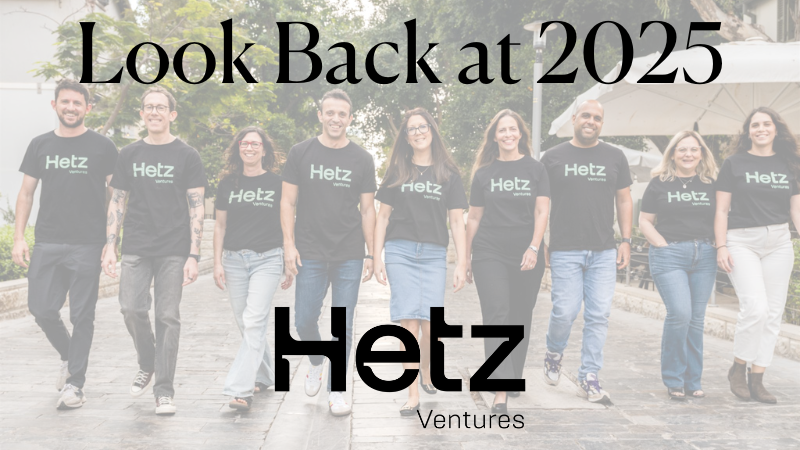4 Questions We Ask Early Stage Generative AI Startups

By Yael Barsheshet, Principal at Hetz Ventures
After starting Hetz Ventures in 2018, what we now commonly know as Generative AI was a key investment theme for us, even though it was still early. Our first investment in generative AI, in 2019, was Tabnine, which is an ‘autocomplete’ AI assistant for software developers, providing whole line and full-function code completions in real time. Our most recent is Tymely, which is leveraging AI to equip retailers with smart, AI-generated customer support.
Fast forward to a few months ago, and suddenly all anyone is talking about is the power of Generative AI, who will lose their jobs (or retrain for new ones) and which of the big tech companies will win the ‘arms’ race for best AI experience.
On the investor side, Gen AI startups are holding increasing interest - despite the downturn that ravaged valuations and capital throughout 2022. With last year’s 78 Gen AI deals worth $1.37 billion, even during these uncertain times investors proved willing to increase their share.

As with any emerging technology, it is challenging to sift the value from the hype and to recognize the early seeds who have the potential to grow into category leaders.
Plus, we've only seen the tip of the AI iceberg. While the AI tech giants are vying to stay ahead in the game, many of us are benefitting from the release of increasingly cutting-edge technologies. The landscape has continued to rapidly expand on a seemingly daily basis, potentially affecting the defensibility and differentiation of many early startups.
In just the first couple months of 2023:
- ChatGPT, (which reached 1 million users in only five days back in November 2022) set the record for fastest growing user base at 100M active users in January 2023.
- Just a few weeks later, Google was scrambling to release its own version, Bard AI, to keep up (and minimize some of the embarrassment at how small it's looking in the face of Open AI’s darling?)
- Microsoft announced integrating the technology behind ChatGPT into its Bing search and Edge browser.
In all of this perceived hype, the main question for us at Hetz Ventures remains: What are the business opportunities for Generative AI? After deep diving on the topic over the last four years, meeting with experts, and investing in several Gen AI companies, these are the four layers of Generative AI companies that we see - and four questions we ask of each.
1. AI-Native Apps: What is your defensibility? How are you different?
Generative AI opened our imaginations to an endless amount of new applications that have the potential to transform various industries. AI Native apps and, specifically, Generative AI-powered applications are becoming increasingly prevalent in our day-to-day lives. Many software companies are rushing to incorporate the new technology into their products, fighting to stay ahead of the game. Two examples from the last few days of February are Notion announcing Notion AI and Mark Zuckerberg announcing a new team at Meta working on AI for Instagram and WhatsApp.
For entrepreneurs, this revolution of Gen AI has led to a new baseline. Now any programmer can build incredible applications powered by AI and Gen AI without the need for AI researchers. This has opened up doors for many to build AI-Native Apps. And we at Hetz definitely believe that there are opportunities to build 10X better solutions rather than incremental improvements. We are looking for those innovative startups that are pushing the boundaries of what can be achieved with AI, and are excited to see how this technology will continue to transform industries and change the way we live and work.
That said, with the opportunity comes major risks that need to be addressed. When we see a company building an AI-native app, we have to ask: How are you different? What is your defensibility? As technology moves fast and the landscape is constantly changing, it is difficult for startups and investors alike to predict how the software stack will look even a few months in the future.
2. MLOps (->LLMOps): Is it a company or a feature?
When a major new technology platform is developed, tools and infrastructure are needed to support this new technology. With the improvement of AI and Gen AI in particular we see two developments that will lead to new demand:
- Increasing numbers of products using AI in production
- Increasing number of developers embedding AI into their code
Machine learning tooling, commonly known as MLOps, has been a highly popular category for startups in recent years. Several MLOps startups have raised significant amounts of funding at staggering valuations. Hetz made its first investment in the space in 2019 with Deepchecks, an open source package for data scientists and ML engineers to run continuous validation of their models.
Now that we have large scale, self supervised pre-trained foundation models available through APIs or open source, we expect to see a wave of innovation to support the development of AI products. New tools and infrastructure are needed and we are excited to see them and support them emerging.
While the timing seems perfect the space is quite crowded with well founded startups that waited years for this moment to shine. Is LLMOps a new category or just a feature for the companies that are already growing in the MLOps space?
3. DevTools: Is now the right time?
As AI technology advances and gains wider adoption among developers, developer tools designed to harness AI are becoming increasingly significant. There has been a noticeable change in who owns the responsibility for training, deploying, and managing AI in software products. Any developer can now perform tasks that were once solely handled by AI experts, marking a significant shift inside R&D organizations.
Developers can now take advantage of pre-built models, libraries, and APIs that allow them to incorporate AI into their projects without requiring extensive knowledge of the underlying models. This democratization of AI development has opened up new opportunities for developers to enhance their software products with cutting-edge AI capabilities, empowering them to innovate and create new solutions.
While there is an existing paradigm for developing AI-powered technologies and products within R&D, this shift from data scientist and AI experts to developers has raised new questions about the best practices and approaches to take. With developers often having different backgrounds and expertise, there is a need to rethink how AI is developed and integrated into products.
It is still unclear what the new balance within R&D will look like. It is possible that new positions and roles will be created - but what we know is that this is a newly developing area with lots of potential.
4. Data: If we don’t know how the data stack will look, how will you build for it?
Last but not least, let’s look at data. In this Generative AI revolution, data (and context) is king, and we believe that there will be a significant impact on how the data stack looks. Three reasons why the data stack is going to change:
- Dependency on data is growing dramatically as real-world applications use foundation models and must feed them with data to get results in the right context.
- Embedding AI models in the data stack will have an enormous impact as new sources of data are introduced and there are changes to the ways data is processed, stored and analyzed.
- More developers will embed models in their code, and so will require access to the data, ensuring that the data pipeline will change to be more accessible to the developers’ stack, beyond AI researchers and data engineers.
We see three areas of opportunity for entrepreneurs building around the changing needs of the data stack:
- Data Accessibility: Making the data pipeline accessible to the end-developers, as indicated in previous point #3..
- Data Governance: With organizations increasing the amounts of data used and stored internally, they will need tools around data privacy, tracking where data is used and anonymization of information.
- Data Pipeline: Unstructured streaming ETL is on the rise as SaaS platforms integrate large language models into their core offerings. Companies specializing in handling streaming unstructured data workflows, curation, and ETL will become vital for removing obstacles.
With all this said, there is one important question we must ask: If we don’t yet know how the data stack will end up looking, how can companies already build for it?
At Hetz, we have had the privilege of collaborating with pioneering entrepreneurs who are creating new categories in the field of AI. Whether you are currently building or thinking about starting a venture in this domain, we would be excited to connect with you. Reach out by emailing yaelb@hetz.vc.
---
Yael Barsheshet is a Principal at Hetz Ventures. Previously, Yael acted as Director of Product and Operations at Zebra Medical Vision (acquired by Nanox Vision). Yael spent her 11-year military career serving in the Israeli Elite Intelligence Unit and 8200 (49’), completing her service as Cyber Operations Commander (Rank Major).


.jpg)